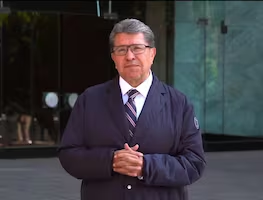Más Información

Inicia pago de la Pensión del Bienestar del bimestre enero-febrero; estas son las fechas de depósito

Violencia en el país evidencía colapso de estrategia de seguridad: PRI; insiste en cambiar el rumbo de combate

Defensa toma protesta al general Maximiliano Cruz Ramos; fungirá como Inspector y Contralor General de División de Estado Mayor

Sheinbaum destaca reducción de homicidios dolosos en último mes de 2024; “Confiamos en nuestra estrategia”, dice

Sheinbaum no hablará de seguridad en reunión con presidentes municipales; revisarán tema de infraestructura

Monreal reitera apoyo a Sheinbaum para este 2025; “la conducción del país está en buenas manos”, dice
As millions of Mexicans set up altars to the dead and buy orange cempasuchil flowers to adorn their offerings of food and drink, the parents of 43 college students missing more than a year refuse to accept the government's finding the young men are dead.
There will be no altar on the Nov. 1-2 Day of the Dead observance for Mauricio Ortega, who was 18 when he and the other students were taken away by police in the city of Iguala on Sept. 26, 2014, and, according to government prosecutors, turned over to a drug gang who killed them and incinerated their remains. Charred bone fragments have provided a match to only two of the students.
Mauricio's father, Meliton Ortega, shakes his head when asked if the family will set up an altar to his son.
"No, for us, our sons are alive," Ortega said. "It's not the way the government says, that we should just accept our grief."
Parents of the missing students have come up with other ways to mark their sons' disappearances.
At the radical rural teachers' college attended by the young men, known as Ayotzinapa, plastic chairs with their names and photos are arranged in rows, a stark reminder of those who used to sit there. Their possessions have been left largely untouched, as if awaiting their return.
After more than 13 months since their disappearance, that seems unlikely. And some, like former Mexican President Vicente Fox, have said the parents "can't live eternally with this problem in their heads ... they have to accept the reality."
Clemente Rodriguez, the father of a missing student, Christian Alfonso Rodríguez, said those who tell the families that their children are dead "are people who don't have a heart" or who work for the government.
A report by an independent panel of experts concluded the students' remains could not have been incinerated at a garbage dump as prosecutors argue. Parents insist their sons are alive and, with little proof, assert that the young men are being held at military bases.
As a way to remember his son, Rodríguez has begun collecting turtles, the mascot of the Ayotzinapa school.
He has tattooed a turtle on his left arm. He points to it and says: "The day my son comes home and says, 'Dad, why didn't you look for me,' I'll say, 'No, son, look, I have a permanent mark ... that ever since you disappeared in 2014, I have looked for you."



